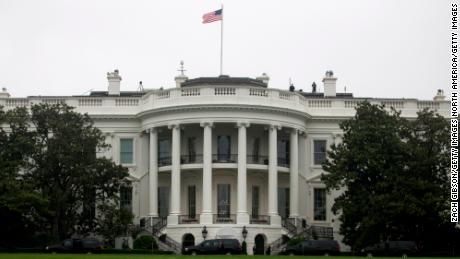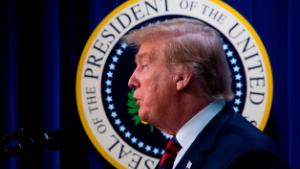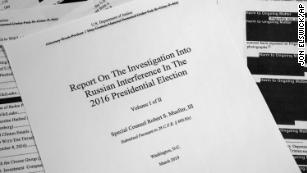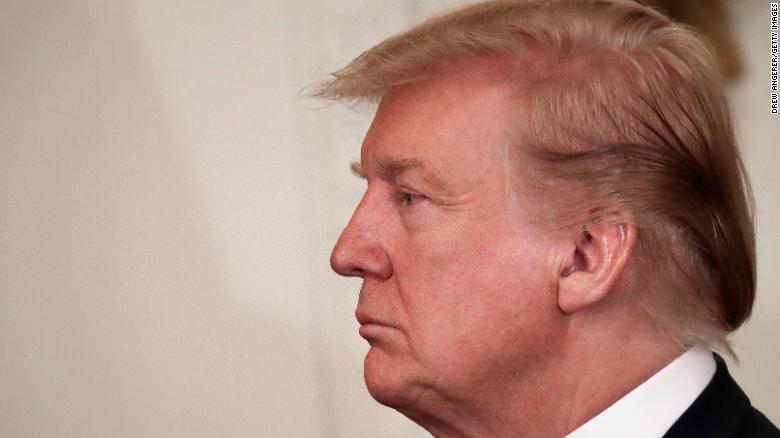Trump digs in against Democrats but there may yet be consequences
It had been more than two years since Michael Caputo, the onetime campaign communications adviser to Donald Trump, had spoken to the man he helped elect president. It was a span that encompassed special counsel Robert Mueller's investigation, a probe with which Caputo had cooperated.
On Wednesday, after the prolonged silence, Trump summoned Caputo to the White House for a reunion. So with his family in tow, Caputo met with the President and first lady in the Oval Office -- a warm reception that appears a distant cry from Trump's fury at other former aides who participated in the probe.
The friendly welcome following the end of Mueller's probe was meant as a reward for Caputo's continuing loyalty. But it was also an indication that a week after a redacted version of Mueller's report was released to the public, Trump continues to dwell on its findings and their sources.
Even as the President is bringing some former staffers back into the fold now the investigation is over, he is lashing out at others who helped Mueller piece together a deeply unflattering portrait of his administration. Just as the report depicts, Trump remains fixated on personal loyalty and is not prepared to forget which of his former aides said what.
Read and search the full Mueller report
Instead of letting his grievances go, Trump is latching onto the report as an attack on his presidency, according to people who have spoken with him. At the same time, he is facing a torrent of oversight requests from Democrats in Congress that he has instructed aides to forcefully resist -- a strategy that some Democrats say could lead more of their party closer to supporting impeachment proceedings.
People close to the President said he had waited for so long for Mueller's investigation to come to a close that he had not foreseen Democrats picking up where the special counsel left off.
Despite the advice he has received from some allies, Trump is loathe put the Russia investigation behind him. Caputo said that, based on his conversation with the President on Wednesday, he is gearing up for a fight rather than settling down.
That aligns with a combative streak on Twitter, where the President has unleashed in striking fashion over the past several days to angrily declare himself innocent of any wrongdoing, immune from impeachment given his economic record and subject to persistent persecution.
He's issued more than 50 tweets on the subject, going after investigators and the media, proclaiming his innocence while picking at old scabs. His messaging has assumed a contradictory theme: while the Mueller report vindicated him from wrongdoing, it was nonetheless a flawed investigation led by corrupt enemies.
"The Mueller Report, despite being written by Angry Democrats and Trump Haters, and with unlimited money behind it ($35,000,000), didn't lay a glove on me," he wrote Wednesday. "I DID NOTHING WRONG."
Earlier, he framed the result as a victorious competition: "We waited for Mueller and WON," he wrote.
And he conflated ongoing Democratic oversight requests with Mueller's work, merging the two into one epic attempt to diminish him and his supporters that he's likely to wield as a campaign issue for months to come. "Congress has no time to legislate, they only want to continue the Witch Hunt, which I have already won," he wrote.
Diverging opinions on path forward
Trump snubs checks on power in massive assault on accountability
It's not the approach some of his advisers advocated after the conclusion of Mueller's investigation. Allies had been urging him to declare victory and move on, believing he got what he wanted -- no criminal indictments for collusion -- and should therefore stop tweeting and commenting on it incessantly.
But he's heard diverging opinions. Another group -- mainly outside the White House -- believe he should launch an aggressive attack on those who investigated him and prompted the investigations. They have cast the strategy as a political winner, allowing Trump to combine still-ongoing investigations by House Democrats into one larger attempt to undermine his presidency.
For now, that appears who he's listened to.
"We just went through the Mueller witch-hunt where you had really 18 angry Democrats that hate President Trump, they hate him with a passion," he said Wednesday on the White House South Lawn. "They came up with no collusion and they actually also came up with no obstruction. But our attorney general ruled based on the information there was no obstruction. So, you have no collusion, no obstruction."
"Now we're finished with it and I thought after two years we'd be finished with it -- no, now the House goes and starts subpoenas," he added. "They want to know every deal I've ever done."
Even as he insists he's not concerned about impeachment -- "not even a little bit," he told reporters on Tuesday -- Trump has nevertheless been discussing it privately with allies and advisers. He's railed against Democrats who he believe are out to take him down in their oversight requests, and said on Wednesday he would contest an expected flurry of demands for documents and testimony from his associates.
"We're fighting all the subpoenas. Look, these aren't like impartial people. The Democrats are trying to win 2020. They're not going to win with the people that I see," he said. "The only way they can luck out is by constantly going after me on nonsense."
White House officials believe there is little downside to stonewalling congressional investigators, even if that results in prolonged legal battles with uncertain outcomes. Blatant defiance from the Trump administration on all fronts could spur years of litigation in the courts, battles that could be drawn out far beyond the lifespan of the Trump presidency and lead to the investigations being minimized if not forgotten.
Stonewalling may have consequences

Dems: We may hold ex-White House aide in contempt
Just days ago Democrats were prepared to wait on impeachment, making the calculation that they would be better served to focus on their own investigations and gather their own facts before plotting ahead with an impeachment proceedings that would likely be thwarted in the Republican-controlled Senate.
But events of recent days have changed the minds of some who say the President's declaration to block Democrats at every turn and deny them witnesses and testimony on a range of subjects from the security clearance process at the White House to how a question about citizenship ended up on the US Census, has gone too far.
In the last 48 hours -- which included defiance of subpoenas to White House officials and the threat of the Trump administration fighting the subpoena for former White House counsel Don McGhan -- Rep. Gerry Connolly, a member of the House Oversight Committee, said the whole landscape has changed, claiming Trump was "pushing" Democrats toward impeachment.
Connolly said there is a sense that Trump's administration may not cooperate at all no matter the subject.
"I think we are now in the midst of a constitutional crisis," he told CNN in an interview Wednesday.
House Oversight Chairman Elijah Cummings also offered a blistering statement Wednesday when confronted with the administration refusal to comply with a subpoena of John Gore, the principal deputy assistant attorney general, who was scheduled to have a deposition with the committee on Thursday morning, but announced Wednesday he wouldn't comply.
"This is a massive, unprecedented, and growing pattern of obstruction. Yesterday, President Trump declared to the entire country that he would obstruct Congress and order all White House officials to defy lawful subpoenas from Congress. Today, the Trump administration went even further by expanding this policy to employees at federal agencies -- even when the subpoenas are bipartisan and supported by Republican Members of Congress," Cummings wrote in a statement.
Connolly and Cummings warned Wednesday that not complying with subpoenas could put administration officials in grave legal trouble.
"These employees and their personal attorneys should think very carefully about their own legal interests rather than being swept up in the obstruction schemes of the Trump administration," Cummings wrote.
Connolly warned that officials could face jail time if they chose to defy their subpoenas even though the legal recourse for members of Congress is somewhat limited if members don't rely on latent powers to hold individuals in contempt by actually holding them physically in a specific location until they comply.
News Courtesy: www.cnn.com













